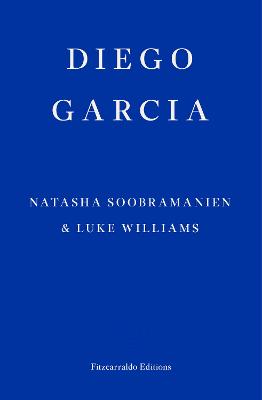
Diego Garcia
Natasha Soobramanien, Luke Williams
£12.99
Description
Edinburgh, 2014. Two writer friends, Damaris and Oliver Pablo, escape London, the city that killed his brother. They spend their days trying to get to the library, bickering over their tanking bitcoin, failing to write or resist the sadness. Then they meet Diego, a poet. He tells them he is named for his mother’s island in the Chagos Archipelago, which she and her community were forced to leave by British soldiers in 1973. Damaris and Oliver Pablo become obsessed with this notorious episode and the continuing resistance of the Chagossian people, and want to write in solidarity. But how to share a story that is not theirs to tell? And how to account for a loss not theirs to grieve? A tragicomedy interrogating the powers of literature alongside the crimes of the British government, Diego Garcia is a collaborative fiction that opens up possibilities for the novel and seeks other ways of living together.
Publisher Review
'Focusing on the ongoing atrocity of the Anglo-American occupation of the Chagos Islands and displacement of their native people, Diego Garcia is a subtle contemplation of the uses of fiction and narrative (for good and bad) and how, where and why individual and collective narratives meet. Taking in artists from Kader Attia to Sophie Podolski, as well as depictions of the Chagossians in poetry, documentaries and essay films, it is a moving study of friendship, allyship and creative forms of political struggle.' - Juliet Jacques, author of Trans: A Memoir 'This thought-provoking, brilliant book sends a hypersensitive probe into the subduction zone between solidarity and exploitation.' - Nell Zink, author of Avalon 'Diego Garcia is an important and highly original work, incredibly well-researched and thought-through.' - Philippe Sands, author of The Last Colony 'Diego Garcia is a beautiful, poignant, anarchic experiment in collaboration and collectivity. This novel does wonderful, innovative things to form and to politics - to style, to voice, to creolization, to propaganda and power and archipelic thinking - and especially to the denials inbuilt to British novels and British politics. Somehow it finds a way of exposing Britain's ongoing shameful occupation of the Chagos Islands while also being a document of literary resistance and originality. It offers models for future thinking.' - Adam Thirlwell, author of Lurid and Cute 'As affecting as it is intellectually agile, Diego Garcia achieves what few novels even aim at - it opens up fresh ways of reading both history and fiction.' - Pankaj Mishra, author of Run and Hide 'Through the intricately woven histories and the corresponding fictions within fictions, the compassion expressed in Diego Garcia highlights the absence of it in those who, forsaking their obligations towards other human beings, exiled the Chagossians from their home. Written in a language at once distant and interior, dazzling, we see that until the Chagossian people are home, nobody is home.' - Vanessa Onwuemezi, author of Dark Neighbourhood 'Listless and urgent, dulled by sadness and yet dancing with anger, moments of unexpected beauty and strange, bright comedy - in Diego Garcia, these tensions are held together by the energy of a singular collaboration, where the interplay between fundamental separation and common cause is staged even at the level of page layout, the writing of the sentences themselves. It is a novel of shared and unshared experience that is wholly unapologetic about not knowing how such a thing is to be written, but risking it nevertheless. The result is compelling, challenging, unprecedented, essential.' - Kate Briggs, author of This Little Art
Book experts at your service
What are you looking for?